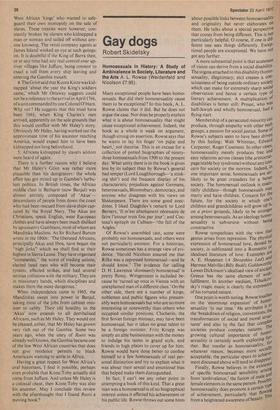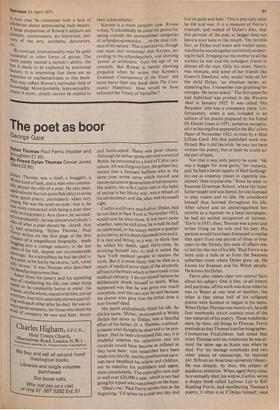Gay dogs
Robert Skidelsky
Homosexuals in History: A Study of Ambivalence in Society, Literature and the Arts A. L. Rowse (Weidenfeld and Nicolson £7.95).
Many exceptional people have been homosexuals. But did their homosexuality cause them to be exceptional? In this book, A. L. Rowse claims that it did. But he does not argue the case. Nor does he properly explain what it is about homosexuality that might cause exceptional achievement. Indeed, the book as a whole is weak on argument, though strong on assertion. Rowse says that he wants to lay his finger 'on pu,Ise and heart,", not theorise. This is an excuse for a collection of potted biographies of ninetythree homosexuals from 1500 to the present day. What unity there is in the book is given less by its subject than by Rowse's general bad temper (Lord Loughborough—'a stinking shit') and the frequent display of his characteristic prejudices against Germans, heterosexuals, Bloomsbury, democracy, and anyone who disagrees with his views on Shakespeare. There are some good anecdotes. I liked Diaghilev's remark to Lord Berners, '11 m'est absolument necessaire de faire l'amour trois fois par jour'; and Cocteau's epitaph on Cubism—`the fall of the Angles.'
Of Rowse's assembled cast, some were probably not homosexuals, and others were not particularly eminent. For a historian, Rowse sometimes has a strange view of evidence. 'Harold Nicolson assured me that Rilke was a repressed homosexual—and he should know.' The evidence for calling D. H. Lawrence 'dominantly homosexual' is pretty flimsy. Wittgenstein is included because he 'turned up once in Vienna with an unexplained man of a different class.' On the other side, there are a number of kings, noblemen and public figures who presumably were homosexuals but who are no more interesting or noteworthy than others who occupied similar positions. Chicherin, the first Soviet foreign minister, may have been homosexual, but it takes no great talent to be a foreign minister. Fritz Krupp was simply an able businessman with the money to indulge his tastes in grand style, and friends in high places w cover up for him. Rowse would have done better to confine himself to a few homosexuals of real personal distinction and try to explain what it was about their sexual and emotional bias that helped make them distinguished.
In fact, I can't see any other point in attempting a book of this kind. That a great man was a homosexual is of no biographical interest unless it affected his achievement or his public life. Rowse throws out some hints
about possible links between homosexuality and originality but never elaborates on them. He talks about a special perspective that comes from being different. This is not particularly helpful. 0 course, if one is different one sees things differently. Exceptional people are exceptional. We have not got any further.
A more substantial point is that acuteness of vision can derive from a social disability. The stigma attached to this disability (homosexuality, illegitimacy, etc) creates a consciousness of being outside ordinary societY which can make for extremely sharp social observation and hence a certain type of, literary achievement.. A multiplication or disabilities is better still: Proust, who was half-Jewish and wholly homosexual, had a flying start.
Membership of a persecuted minority can produce, through empathy with other such, groups, a passion for social justice. Some °I Rowse's subjects seem to have been driven by this feeling: Walt Whitman, Edward Carpenter, Roger Casement. In other cases, homosexuality merely produces free and easy relations across classes (the aristocrat' page/stable boy syndrome) without any con' cern for society or the morrow. Indeed, hi one important sense, homosexuals are onlikely to be great crusaders for a better society. The homosexual outlook is cssentially childless—though homosexuals IllaY marry and have children. Concern for the future, for the society in which one's children and grandchildren will grow up is' on a priori grounds, likely to be stronger among heterosexuals. As an ideology hong)" sexuality is subversive without being constructive. Rowse sympathises with the view thal genius arises from repression. The phYsica expression of homosexual love, denied bY society, is sublimated into a Romantic or idealised literature of love. Examples ar„,e A. E. Housman (A Shropshire Lad) an' Herman Melville (Billy Budd), GOidSWOrtl Lowes Dickinson's idealised view arlCi Greece has the same element of wishfulfilment. In another medium, Tchaikovsky's tragic music is clearly the expression of his tortured nature. One point is worth noting. Rowse touches on the 'enormous expansion' of hol11°T. sexuality 'in our time.' He attributes it to_ the 'breakdown of religion, conventions, thc transformation of social and moral struc" tures' and also to the fact that cornPl!: societies produce complex natures. Tno_. growing cultural importance of nom, r, sexuality is certainly worth exploring 51,1or thee But insofar as homosexualitY, ray whatever reason, becomes more socia acceptable, the particular spurs to achieva`r. ment discussed above will tend to disaPPe Finally, Rowse believes in the exisrerI.; of specific homosexual sensibility arid from 'ambivalence,' the fusion of male female elements in the same person. posslu"le homosexuality does promote a certain tY,r)Pg of achievement, particularly that flot..1,..is from a heightened awareness of beauty. "
!n turn may be connected with a lack of inhibition about appreciating male beauty. A large proportion of Rowse's subjects are Painters, connoisseurs, art historians, pat
rons of the arts, aesthetes, decorators, etc.
. contrast, homosexuality may be quite
incidental to other forms of genius. The In, ore purely mental a person's ability, the less it needs to be explained by emotional factors. It is interesting that there are no scientists or mathematicians in this book. ,Tins may reflect Rowse's particular field of icnowledge. More probably, homosexuality, where it exists, simply cannot be related to
their achievements.
Keynes is a more complex case. Rowse writes, 'Undoubtedly he owed his genius for seeing outside the conventional categories of orthodox economics. .. to the dual richness of his nature.' This is perceptive, though one must also remember that Keynes, according to his schoolteachers, was showing 'power at arithmetic' from the age of six onwards. But Rowse is merely showing prejudice when he writes that Keynes's Economic Consequences of the Peace 'did more harm than any book since The Communist Manifesto.' How would he have enforced the Treaty of Versailles?



































 Previous page
Previous page